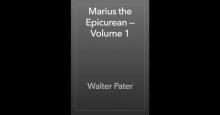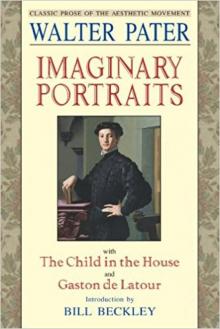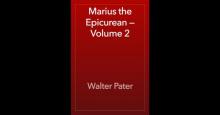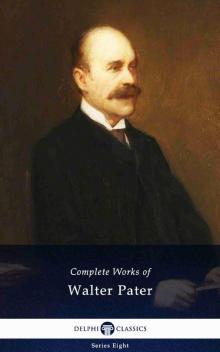- Home
- Walter Pater
Delphi Complete Works of Walter Pater
Delphi Complete Works of Walter Pater Read online
The Complete Works of
WALTER PATER
(1839-1894)
Contents
The Fiction
MARIUS THE EPICUREAN
GASTON DE LATOUR
The Non-Fiction
STUDIES IN THE HISTORY OF THE RENAISSANCE
IMAGINARY PORTRAITS
APPRECIATIONS: WITH AN ESSAY ON STYLE
PLATO AND PLATONISM: A SERIES OF LECTURES
GREEK STUDIES: A SERIES OF ESSAYS
MISCELLANEOUS STUDIES: A SERIES OF ESSAYS
ESSAYS FROM ‘THE GUARDIAN’
UNCOLLECTED ESSAYS
The Essays
LIST OF ESSAYS IN CHRONOLOGICAL ORDER
LIST OF ESSAYS IN ALPHABETICAL ORDER
The Criticism
THE CRITIC AS ARTIST by Oscar Wilde
MR. PATER ON IDEAL ÆSTHETICISM by George Edward Woodberry
WALTER PATER by Arthur Symons
WALTER PATER by John Cowper Powys
WALTER PATER by Charles Edwyn Vaughan
ON RE-READING WALTER PATER by Richard Le Gallienne
THE MODERN ESSAY by Virginia Woolf
The Biographies
WALTER PATER by A. C. Benson
WALTER HORATIO PATER by Edmund Gosse
The Delphi Classics Catalogue
© Delphi Classics 2017
Version 1
The Complete Works of
WALTER PATER
By Delphi Classics, 2017
COPYRIGHT
Complete Works of Walter Pater
First published in the United Kingdom in 2017 by Delphi Classics.
© Delphi Classics, 2017.
All rights reserved. No part of this publication may be reproduced, stored in a retrieval system, or transmitted, in any form or by any means, without the prior permission in writing of the publisher, nor be otherwise circulated in any form other than that in which it is published.
ISBN: 978 1 78656 093 3
Delphi Classics
is an imprint of
Delphi Publishing Ltd
Hastings, East Sussex
United Kingdom
Contact: [email protected]
www.delphiclassics.com
The Fiction
Shadwell and the Thames riverfront, East London — Pater’s birthplace
Shadwell in the nineteenth century — Pater’s father Richard Glode Pater was a physician that had moved his family to an impoverished borough of London to practice medicine among the poor.
MARIUS THE EPICUREAN
HIS SENSATIONS AND IDEAS
Pater’s only complete full-length piece of fiction was first published in 1885 and concerns events set in AD 161-177 in the Rome of the Antonines. Marius the Epicurean explores the intellectual development of its protagonist, a young Roman of integrity, in his pursuit of a congenial religion or philosophy at a time of change and uncertainty, which Pater likens to his own era. Narrated in third-person, the novel features various interpolated discourses, ranging from adaptations of classical and early Christian writings to Marius’ diary and authorial comment.
The novel introduces Marius as a sensitive only child of a patrician family, growing up near Luna in rural Etruria. He is interested in the traditions and rituals of the ancestral religion of the Lares and intrigued following a boyhood visit to a sanctuary of Aesculapius. His childhood ends with the death of his mother, having lost his father from a very young age, just like the author. Marius shortly departs for boarding school in Pisae, where he falls under the influence of a brilliant, hedonistic older boy, Flavianus, who awakens in him a love of literature. Together they read with delight the story of Cupid and Psyche in Apuleius’ novel The Golden Ass. Flavianus falls ill during the Festival of Isis and Marius tends him during his long death-agony, bringing the novel to the end of its first part.
Grown to manhood, Marius embraces the philosophy of the ‘flux’ of Heraclitus and the Epicureanism of Aristippus. He journeys to Rome in AD 166, encountering by chance on the way a blithesome young knight, Cornelius, who becomes a trusted friend. Marius explores Rome in awe; due to his great attainments in Greek letters, he is soon appointed amanuensis to the Emperor Marcus Aurelius. Aurelius’ Meditations on Stoicism, the works of Plato and the public lectures of the rhetorician Fronto open Marius’ eyes to the narrowness of Epicureanism. The Emperor’s indifference, however, to the cruelty to animals in the amphitheatre, and later to the torments inflicted on people there, causes Marius to question the values of Stoicism, leaving him disillusioned with Rome.
The novel explores a theme central to Pater’s thinking and already examined in his earlier Imaginary Portrait ‘The Child in the House’ (1878), stressing the importance to the adult personality of formative childhood experiences. Conscious of his growing influence and aware that the ‘Conclusion’ to his Studies in the History of the Renaissance (1873) had been misconstrued by some critics as amoral, Pater set about clarifying his published ideas. As he states in the third edition of The Renaissance (1888), Marius the Epicurean “deals more fully with thoughts suggested by” the ‘Conclusion’. In particular Pater is careful in the novel to distinguish between ‘hedonism’, as it is usually understood, and Marius’ cerebral, ascetic version of Epicureanism. The protagonist’s quest exemplifies Pater’s belief that we should “be for ever testing new opinions, never acquiescing in a facile orthodoxy”. Marius the Epicurean celebrates Pater’s ideal of the aesthetic life, based on sensation and perception, further developing his theory of the stimulating effect of the pursuit of sensation and insight as an ideal in itself.
The novel was favourably reviewed and sold well, whilst a second edition with minor revisions was released in the same year. In an early review in Macmillan’s Magazine the novelist Mary Ward praised “the great psychological interest” of the novel, but identified as a weakness its tendency to depict Christianity from an aesthetic viewpoint, rather than presenting it as life’s ultimate truth and reality. T. S. Eliot, with his Stoic and Christian sympathies, concurred in his influential 1930 essay.
The first edition’s title page
Walter Pater by W.S. Wright, close to the time of publishing his only novel
CONTENTS
PART THE FIRST
CHAPTER I: “THE RELIGION OF NUMA”
CHAPTER II: WHITE-NIGHTS
CHAPTER III: CHANGE OF AIR
CHAPTER IV: THE TREE OF KNOWLEDGE
CHAPTER V: THE GOLDEN BOOK
CHAPTER VI: EUPHUISM
CHAPTER VII: A PAGAN END
PART THE SECOND
CHAPTER VIII: ANIMULA VAGULA
CHAPTER IX: NEW CYRENAICISM
CHAPTER X: ON THE WAY
CHAPTER XI: “THE MOST RELIGIOUS CITY IN THE WORLD”
CHAPTER XII: THE DIVINITY THAT DOTH HEDGE A KING
CHAPTER XIII: THE “MISTRESS AND MOTHER” OF PALACES
CHAPTER XIV: MANLY AMUSEMENT
PART THE THIRD
CHAPTER XV: STOICISM AT COURT
CHAPTER XVI: SECOND THOUGHTS
CHAPTER XVII: BEATA URBS
CHAPTER XVIII: “THE CEREMONY OF THE DART”
CHAPTER XIX: THE WILL AS VISION
PART THE FOURTH
CHAPTER XX: TWO CURIOUS HOUSES
I. GUESTS
CHAPTER XXI: TWO CURIOUS HOUSES
II. THE CHURCH IN CECILIA’S HOUSE
CHAPTER XXII: “THE MINOR PEACE OF THE CHURCH”
CHAPTER XXIII: DIVINE SERVICE.
CHAPTER XXIV: A CONVERSATION NOT IMAGINARY
CHAPTER XXV: SUNT LACRIMAE RERUM
CHAPTER XXVI: THE MARTYRS
CHAPTER XXVII: THE TRIUMPH OF
MARCUS AURELIUS
CHAPTER XXVIII: ANIMA NATURALITER CHRISTIANA
The Roman Empire in AD 125
Bust of Marcus Aurelius, Palazzo Nuovo, Rome
PART THE FIRST
CHAPTER I: “THE RELIGION OF NUMA”
As, in the triumph of Christianity, the old religion lingered latest in the country, and died out at last as but paganism — the religion of the villagers, before the advance of the Christian Church; so, in an earlier century, it was in places remote from town-life that the older and purer forms of paganism itself had survived the longest. While, in Rome, new religions had arisen with bewildering complexity around the dying old one, the earlier and simpler patriarchal religion, “the religion of Numa,” as people loved to fancy, lingered on with little change amid the pastoral life, out of the habits and sentiment of which so much of it had grown. Glimpses of such a survival we may catch below the merely artificial attitudes of Latin pastoral poetry; in Tibullus especially, who has preserved for us many poetic details of old Roman religious usage.
At mihi contingat patrios celebrare Penates,
Reddereque antiquo menstrua thura Lari:
— he prays, with unaffected seriousness. Something liturgical, with repetitions of a consecrated form of words, is traceable in one of his elegies, as part of the order of a birthday sacrifice. The hearth, from a spark of which, as one form of old legend related, the child Romulus had been miraculously born, was still indeed an altar; and the worthiest sacrifice to the gods the perfect physical sanity of the young men and women, which the scrupulous ways of that religion of the hearth had tended to maintain. A religion of usages and sentiment rather than of facts and belief, and attached to very definite things and places — the oak of immemorial age, the rock on the heath fashioned by weather as if by some dim human art, the shadowy grove of ilex, passing into which one exclaimed involuntarily, in consecrated phrase, Deity is in this Place! Numen Inest! — it was in natural harmony with the temper of a quiet people amid the spectacle of rural life, like that simpler faith between man and man, which Tibullus expressly connects with the period when, with an inexpensive worship, the old wooden gods had been still pressed for room in their homely little shrines.
And about the time when the dying Antoninus Pius ordered his golden image of Fortune to be carried into the chamber of his successor (now about to test the truth of the old Platonic contention, that the world would at last find itself happy, could it detach some reluctant philosophic student from the more desirable life of celestial contemplation, and compel him to rule it), there was a boy living in an old country-house, half farm, half villa, who, for himself, recruited that body of antique traditions by a spontaneous force of religious veneration such as had originally called them into being. More than a century and a half had past since Tibullus had written; but the restoration of religious usages, and their retention where they still survived, was meantime come to be the fashion through the influence of imperial example; and what had been in the main a matter of family pride with his father, was sustained by a native instinct of devotion in the young Marius. A sense of conscious powers external to ourselves, pleased or displeased by the right or wrong conduct of every circumstance of daily life — that conscience, of which the old Roman religion was a formal, habitual recognition, was become in him a powerful current of feeling and observance. The old-fashioned, partly puritanic awe, the power of which Wordsworth noted and valued so highly in a northern peasantry, had its counterpart in the feeling of the Roman lad, as he passed the spot, “touched of heaven,” where the lightning had struck dead an aged labourer in the field: an upright stone, still with mouldering garlands about it, marked the place. He brought to that system of symbolic usages, and they in turn developed in him further, a great seriousness — an impressibility to the sacredness of time, of life and its events, and the circumstances of family fellowship; of such gifts to men as fire, water, the earth, from labour on which they live, really understood by him as gifts — a sense of religious responsibility in the reception of them. It was a religion for the most part of fear, of multitudinous scruples, of a year-long burden of forms; yet rarely (on clear summer mornings, for instance) the thought of those heavenly powers afforded a welcome channel for the almost stifling sense of health and delight in him, and relieved it as gratitude to the gods.
The day of the “little” or private Ambarvalia was come, to be celebrated by a single family for the welfare of all belonging to it, as the great college of the Arval Brothers officiated at Rome in the interest of the whole state. At the appointed time all work ceases; the instruments of labour lie untouched, hung with wreaths of flowers, while masters and servants together go in solemn procession along the dry paths of vineyard and cornfield, conducting the victims whose blood is presently to be shed for the purification from all natural or supernatural taint of the lands they have “gone about.” The old Latin words of the liturgy, to be said as the procession moved on its way, though their precise meaning was long since become unintelligible, were recited from an ancient illuminated roll, kept in the painted chest in the hall, together with the family records. Early on that day the girls of the farm had been busy in the great portico, filling large baskets with flowers plucked short from branches of apple and cherry, then in spacious bloom, to strew before the quaint images of the gods — Ceres and Bacchus and the yet more mysterious Dea Dia — as they passed through the fields, carried in their little houses on the shoulders of white-clad youths, who were understood to proceed to this office in perfect temperance, as pure in soul and body as the air they breathed in the firm weather of that early summer-time. The clean lustral water and the full incense-box were carried after them. The altars were gay with garlands of wool and the more sumptuous sort of blossom and green herbs to be thrown into the sacrificial fire, fresh-gathered this morning from a particular plot in the old garden, set apart for the purpose. Just then the young leaves were almost as fragrant as flowers, and the scent of the bean-fields mingled pleasantly with the cloud of incense. But for the monotonous intonation of the liturgy by the priests, clad in their strange, stiff, antique vestments, and bearing ears of green corn upon their heads, secured by flowing bands of white, the procession moved in absolute stillness, all persons, even the children, abstaining from speech after the utterance of the pontifical formula, Favete linguis! — Silence! Propitious Silence! — lest any words save those proper to the occasion should hinder the religious efficacy of the rite.
With the lad Marius, who, as the head of his house, took a leading part in the ceremonies of the day, there was a devout effort to complete this impressive outward silence by that inward tacitness of mind, esteemed so important by religious Romans in the performance of these sacred functions. To him the sustained stillness without seemed really but to be waiting upon that interior, mental condition of preparation or expectancy, for which he was just then intently striving. The persons about him, certainly, had never been challenged by those prayers and ceremonies to any ponderings on the divine nature: they conceived them rather to be the appointed means of setting such troublesome movements at rest. By them, “the religion of Numa,” so staid, ideal and comely, the object of so much jealous conservatism, though of direct service as lending sanction to a sort of high scrupulosity, especially in the chief points of domestic conduct, was mainly prized as being, through its hereditary character, something like a personal distinction — as contributing, among the other accessories of an ancient house, to the production of that aristocratic atmosphere which separated them from newly-made people. But in the young Marius, the very absence from those venerable usages of all definite history and dogmatic interpretation, had already awakened much speculative activity; and to-day, starting from the actual details of the divine service, some very lively surmises, though scarcely distinct enough to be thoughts, were moving backwards and forwards in his mind, as the stirring wind had done all day among the trees, and were like the passing of some mysterious influence over all the e
lements of his nature and experience. One thing only distracted him — a certain pity at the bottom of his heart, and almost on his lips, for the sacrificial victims and their looks of terror, rising almost to disgust at the central act of the sacrifice itself, a piece of everyday butcher’s work, such as we decorously hide out of sight; though some then present certainly displayed a frank curiosity in the spectacle thus permitted them on a religious pretext. The old sculptors of the great procession on the frieze of the Parthenon at Athens, have delineated the placid heads of the victims led in it to sacrifice, with a perfect feeling for animals in forcible contrast with any indifference as to their sufferings. It was this contrast that distracted Marius now in the blessing of his fields, and qualified his devout absorption upon the scrupulous fulfilment of all the details of the ceremonial, as the procession approached the altars.
The names of that great populace of “little gods,” dear to the Roman home, which the pontiffs had placed on the sacred list of the Indigitamenta, to be invoked, because they can help, on special occasions, were not forgotten in the long litany — Vatican who causes the infant to utter his first cry, Fabulinus who prompts his first word, Cuba who keeps him quiet in his cot, Domiduca especially, for whom Marius had through life a particular memory and devotion, the goddess who watches over one’s safe coming home. The urns of the dead in the family chapel received their due service. They also were now become something divine, a goodly company of friendly and protecting spirits, encamped about the place of their former abode — above all others, the father, dead ten years before, of whom, remembering but a tall, grave figure above him in early childhood, Marius habitually thought as a genius a little cold and severe.
Candidus insuetum miratur limen Olympi,

 Marius the Epicurean — Volume 1
Marius the Epicurean — Volume 1 Imaginary Portraits
Imaginary Portraits Marius the Epicurean — Volume 2
Marius the Epicurean — Volume 2 Delphi Complete Works of Walter Pater
Delphi Complete Works of Walter Pater